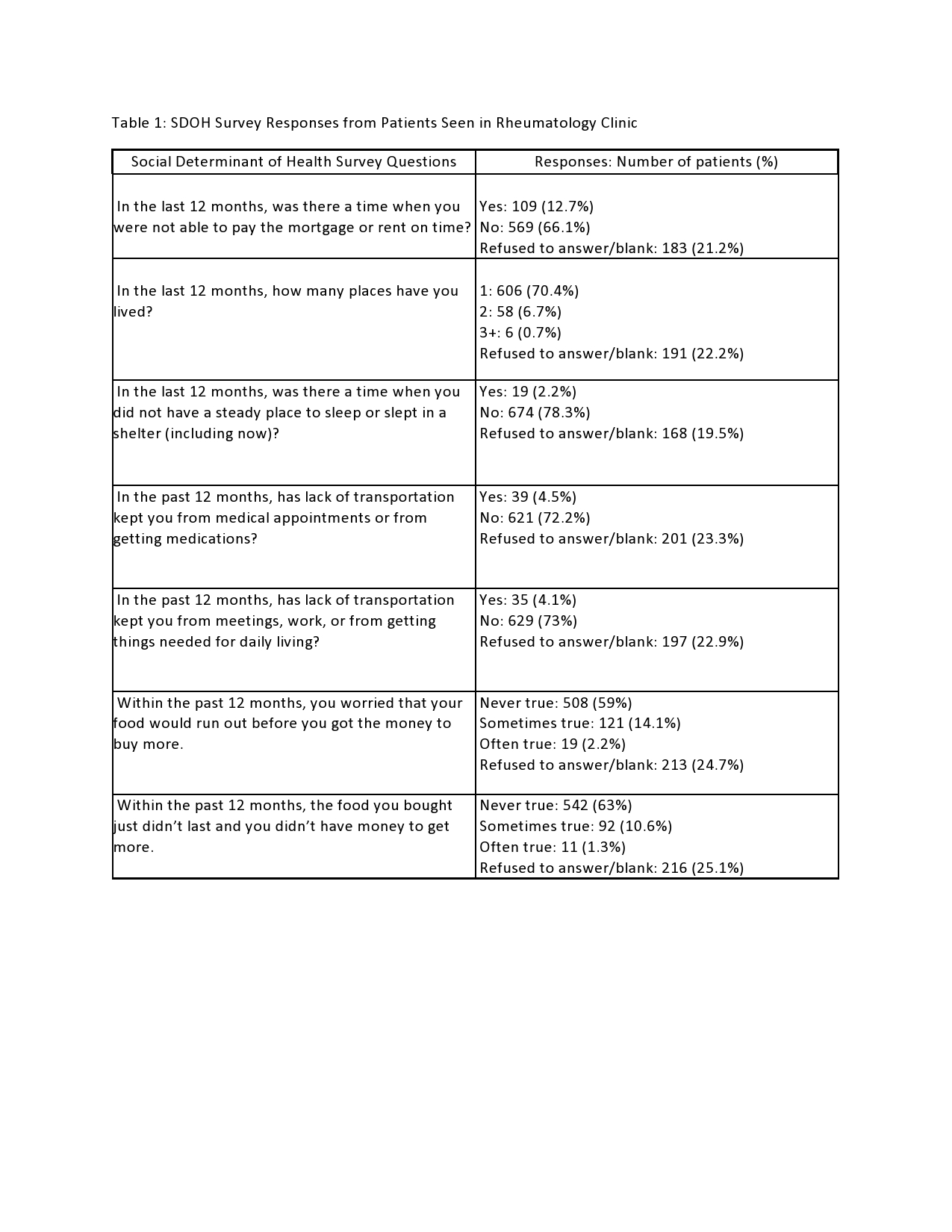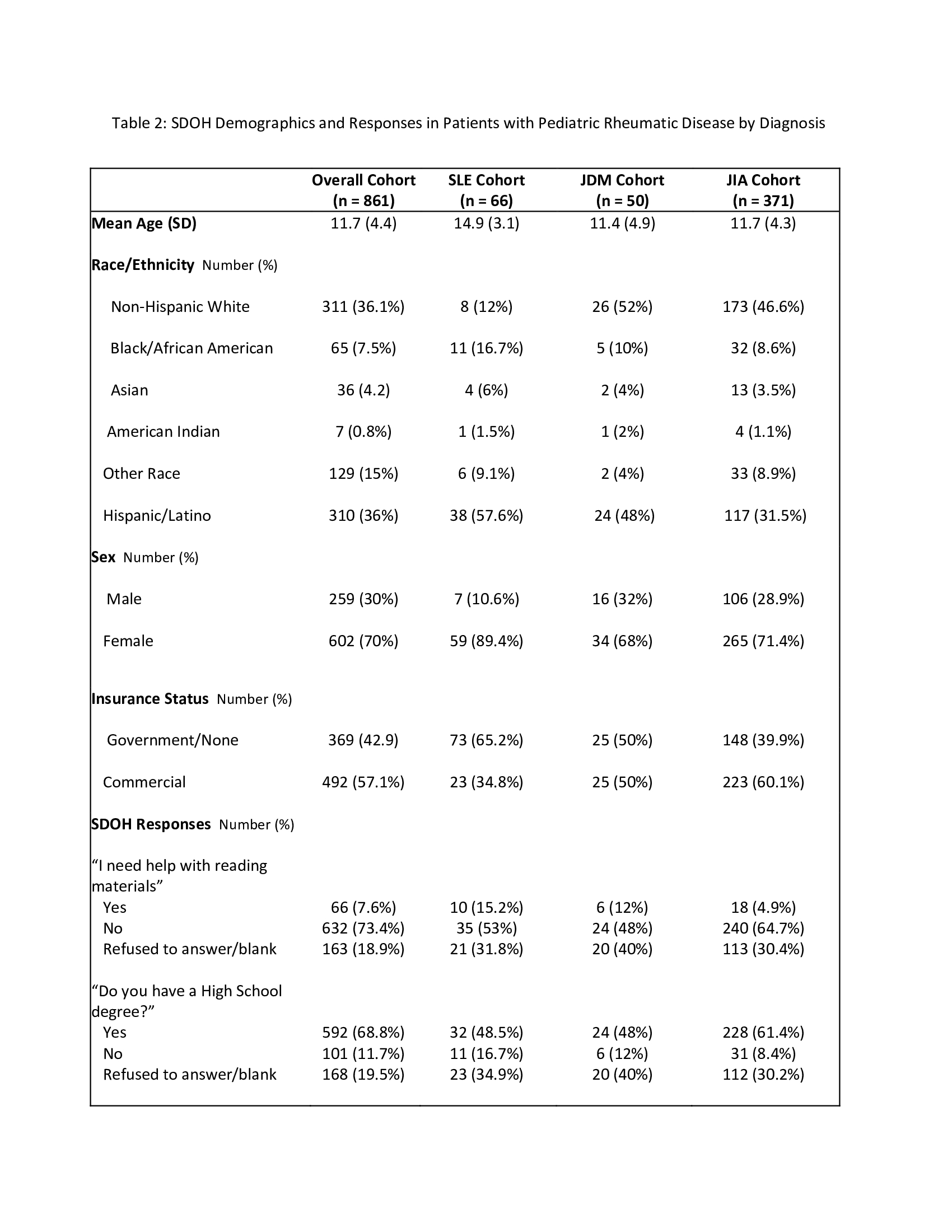Session Information
Date: Monday, November 13, 2023
Title: (1013–1032) Healthcare Disparities in Rheumatology Poster II: Socioeconomic Determinants
Session Type: Poster Session B
Session Time: 9:00AM-11:00AM
Background/Purpose: Rheumatic disease disproportionately impacts certain socioeconomic, racial, and ethnic groups frequently resulting in health care inequities. Social determinants of health (SDOH) are conditions in the environment where people exist that encompass a wide range of systems, and influence quality of life, outcomes, and risks. Aligning with health equity literature, children from disadvantaged socioeconomic backgrounds experience worse outcomes and delays in care.1 In adult SLE, the negative impacts of SDOH are well described with unfavorable determinants leading to more severe disease and increased mortality.2 We aimed to identify SDOH in a cohort of children with rheumatic disease followed at a single center to begin to explore risk factors for disparities in our patient population.
Methods: Patient caregivers completed a SDOH survey prior to the start of the clinic visit. Survey results from February to May 2023 were extracted from the EMR. Patient demographics, diagnosis, and survey responses were analyzed using standard descriptive statistics.
Results: We analyzed SDOH surveys (n=861) completed during the initial survey roll out. Most patients surveyed were female (70%), and the average age was 11.7 years. Seventy percent reported White race, and 38% identified their ethnicity as Hispanic/Latino. Eleven percent of respondents had no high school degree, and 7.6% reported they need help with reading materials. Approximately 4% of patients reported needing help with cost of care, utilities, food, housing, or transportation. Twenty-one percent reported being often or sometimes worried about food security (Table 1). Of the patients surveyed, 66had a diagnosis of SLE,50 had JDM, and 371 had JIA(Table 2). In comparison with JIA and JDM families, SLE caregivers disclosed a statistically significant higher rate of needing help with reading materials (p=0.0136) and lack of high school degree (p=0.0355).
Conclusion: Patients seen in our center come from diverse socioeconomic, racial, and ethnic backgrounds. The SDOH survey identified critical barriers to patient care including health literacy, food security, and living costs such as transportation, housing, and utilities. Health literacy may be an essential limiting factor for our families with children who have SLE. Further study is needed to understand the impact of SDOH on outcomes for children with rheumatic disease and how it varies by diagnosis. Future efforts to improve the management and outcomes of children with rheumatic disease should focus on specific SDOH that could influence health inequities.
1. Akinsete AM, Woo JMP, Rubinstein TB. Disparities in Pediatric Rheumatic Diseases. Rheum Dis Clin North Am. Feb 2022;48(1):183-198. doi:10.1016/j.rdc.2021.09.014
2. Williams JN, Drenkard C, Lim SS. The impact of social determinants of health on the presentation, management and outcomes of systemic lupus erythematosus. Rheumatology (Oxford). Mar 29 2023;62(Suppl 1):i10-i14. doi:10.1093/rheumatology/keac613
To cite this abstract in AMA style:
Ciaglia K, Sloan E, Wright T. Social Determinants of Health in Children with Rheumatic Disease: A Single Center Cohort [abstract]. Arthritis Rheumatol. 2023; 75 (suppl 9). https://acrabstracts.org/abstract/social-determinants-of-health-in-children-with-rheumatic-disease-a-single-center-cohort/. Accessed .« Back to ACR Convergence 2023
ACR Meeting Abstracts - https://acrabstracts.org/abstract/social-determinants-of-health-in-children-with-rheumatic-disease-a-single-center-cohort/


